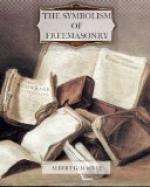[38] P “Was not all the knowledge Of the Egyptians writ in mystic symbols? Speak not the Scriptures oft in parables? Are not the choicest fables of the poets, That were the fountains and first springs of wisdom, Wrapped in perplexed allegories?”
BEN JONSON, Alchemist, act ii. sc. i. P/
[39] The distinguished German mythologist Mueller defines a symbol to be “an eternal, visible sign, with which a spiritual feeling, emotion, or idea is connected.” I am not aware of a more comprehensive, and at the same time distinctive, definition.
[40] And it may be added, that the word becomes a symbol of an idea; and hence, Harris, in his “Hermes,” defines language to be “a system of articulate voices, the symbols of our ideas, but of those principally which are general or universal.”—Hermes, book iii. ch. 3.
[41] “Symbols,” says Mueller, “are evidently coeval with the human race; they result from the union of the soul with the body in man; nature has implanted the feeling for them in the human heart.”—Introduction to a Scientific System of Mythology, p. 196, Leitch’s translation.—R.W. Mackay says, “The earliest instruments of education were symbols, the most universal symbols of the multitudinously present Deity, being earth or heaven, or some selected object, such as the sun or moon, a tree or a stone, familiarly seen in either of them.”—Progress of the Intellect, vol. i p. 134.
[42] Between the allegory, or parable, and the symbol, there is, as I have said, no essential difference. The Greek verb [Greek: paraballo], whence comes the word parable, and the verb [Greek: symballo] in the same language, which is the root of the word symbol, both have the synonymous meaning “to compare.” A parable is only a spoken symbol. The definition of a parable given by Adam Clarke is equally applicable to a symbol, viz.: “A comparison or similitude, in which one thing is compared with another, especially spiritual things with natural, by which means these spiritual things are better understood, and make a deeper impression on the attentive mind.”
[43] North British Review, August, 1851. Faber passes a similar encomium. “Hence the language of symbolism, being so purely a language of ideas, is, in one respect, more perfect than any ordinary language can be: it possesses the variegated elegance of synonymes without any of the obscurity which arises from the use of ambiguous terms.”—On the Prophecies, ii. p. 63.
[44] “By speculative Masonry we learn to subdue our passions, to act upon the square, to keep a tongue of good report, to maintain secrecy, and practise charity.”—Lect. of Fel. Craft. But this is a very meagre definition, unworthy of the place it occupies in the lecture of the second degree.




